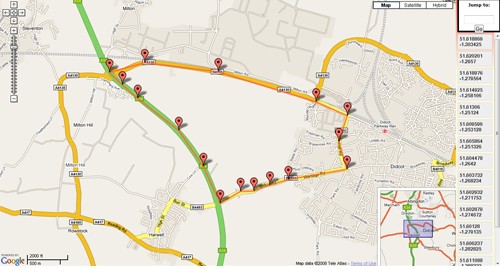


GPS Tracking For Those Suffering From Dementia:
Home | Contact Us | Sitemap | Privacy Policy | Medical Alert Basics | Medical Alert Reviews | Submit A Review | Home Safety | Accident Prevention Independent Living Aids | Independent Living Advice
Copyright 2008-2011 Medical Alert Reviews
Copyright 2008-2011 Medical Alert Reviews


More Medical Alert Resources On MedicalAlertReviews.Com:
Medical Alert Reviews
Special Features Of Medical Alert Systems
Guide To Independent Living
Home Safety
Preventing Accidents In The Home
Special Features Of Medical Alert Systems
Guide To Independent Living
Home Safety
Preventing Accidents In The Home
Medical GPS units usually require a monthly fee to operate properly. These fees go to the company that provide you with the hardware you will need, and the service to monitor the device in real time. In general, here's how the monitoring service works: GPS determines the patient's location, and transmits data to your service provider by way of cellular signal (most of these units use a SIM card like a regular cell phone). Your service provider is then responsible for contacting you or the authorities should your loved one leave a predetermined area, or if he/she presses the unit's emergency (or "SOS") button. You can also monitor the patient's location yourself through your provider's web portal, or even Google Earth.
Medical GPS Units Are Different:
GPS tracking units for medical purposes determine their location in much the same way as vehicle units do. However, that is where their similarities end. For starters, medical GPS units do not feature an LCD screen to access data. This allows manufacturers to make the units as small as possible (some of these devices are no larger than a disposable lighter) for maximum portability. In addition, the lack of an LCD screen reduces demand on the unit's rechargable battery. Many models can operate for up to five days between charges. Overall, medical GPS units are only designed to determine location, and send emergency signals.
GPS tracking units for medical purposes determine their location in much the same way as vehicle units do. However, that is where their similarities end. For starters, medical GPS units do not feature an LCD screen to access data. This allows manufacturers to make the units as small as possible (some of these devices are no larger than a disposable lighter) for maximum portability. In addition, the lack of an LCD screen reduces demand on the unit's rechargable battery. Many models can operate for up to five days between charges. Overall, medical GPS units are only designed to determine location, and send emergency signals.
The GPS You Already Know About:
Most of us are familiar with GPS units designed for vehicles. They communicate with at least four satellites at a time to "triangulate" your location, and can even determine the speed you're driving. A touchscreen LCD display allows you to view this information at any time. Since the U.S. Department of Defense allows the public to use their network of twenty-four satellites for free, you don't need to pay any monthly fees for your GPS unit to work.
Most of us are familiar with GPS units designed for vehicles. They communicate with at least four satellites at a time to "triangulate" your location, and can even determine the speed you're driving. A touchscreen LCD display allows you to view this information at any time. Since the U.S. Department of Defense allows the public to use their network of twenty-four satellites for free, you don't need to pay any monthly fees for your GPS unit to work.

While medical alert systems can be very effective, they may not be the best (or only) solution for your particular situation. Like countless others, you may have a friend or relative suffering from Alzheimer's, or a similar brain disorder such as vascular dementia. One of the more dangerous symptoms of these disorders is the tendancy for the patient to wander from the safety of their residence for hours, or even days at a time. Fortunately, there are products and services available that can track your loved one's location in real time. These solutions utilize GPS (global positioning system) and in most cases, cellular technology....
I Thought GPS Didn't Work Indoors?
You're right, in most cases it doesn't. The system solves this issue by enabling GSM locations. This simply means the unit will use local cell phone towers to determine its general location if GPS isn't available. This method is accurate to about a one mile radius, not nearly as precise as GPS. Not all providers use this "back up" method, so be sure to confirm this with any monitoring service you speak with.
You're right, in most cases it doesn't. The system solves this issue by enabling GSM locations. This simply means the unit will use local cell phone towers to determine its general location if GPS isn't available. This method is accurate to about a one mile radius, not nearly as precise as GPS. Not all providers use this "back up" method, so be sure to confirm this with any monitoring service you speak with.
Above: A GPS web portal that integrates with Google Maps. Note the addition of a customer-defined "geofence". (Select for a larger view).
